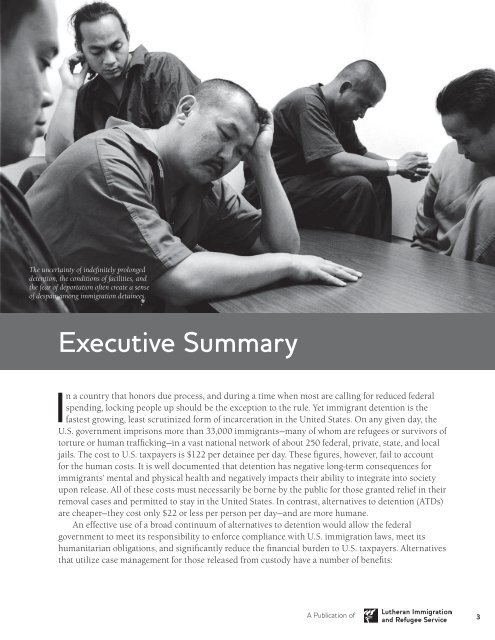Unlocking Liberty: A Way Forward for US Immigration - LIRS
Unlocking Liberty: A Way Forward for US Immigration - LIRS
Unlocking Liberty: A Way Forward for US Immigration - LIRS
You also want an ePaper? Increase the reach of your titles
YUMPU automatically turns print PDFs into web optimized ePapers that Google loves.
The uncertainty of indefinitely prolonged<br />
detention, the conditions of facilities, and<br />
the fear of deportation often create a sense<br />
of despair among immigration detainees.<br />
Executive Summary<br />
In a country that honors due process, and during a time when most are calling <strong>for</strong> reduced federal<br />
spending, locking people up should be the exception to the rule. Yet immigrant detention is the<br />
fastest growing, least scrutinized <strong>for</strong>m of incarceration in the United States. On any given day, the<br />
U.S. government imprisons more than 33,000 immigrants—many of whom are refugees or survivors of<br />
torture or human trafficking—in a vast national network of about 250 federal, private, state, and local<br />
jails. The cost to U.S. taxpayers is $122 per detainee per day. These figures, however, fail to account<br />
<strong>for</strong> the human costs. It is well documented that detention has negative long-term consequences <strong>for</strong><br />
immigrants’ mental and physical health and negatively impacts their ability to integrate into society<br />
upon release. All of these costs must necessarily be borne by the public <strong>for</strong> those granted relief in their<br />
removal cases and permitted to stay in the United States. In contrast, alternatives to detention (ATDs)<br />
are cheaper—they cost only $22 or less per person per day—and are more humane.<br />
An effective use of a broad continuum of alternatives to detention would allow the federal<br />
government to meet its responsibility to en<strong>for</strong>ce compliance with U.S. immigration laws, meet its<br />
humanitarian obligations, and significantly reduce the financial burden to U.S. taxpayers. Alternatives<br />
that utilize case management <strong>for</strong> those released from custody have a number of benefits:<br />
A Publication of<br />
3


